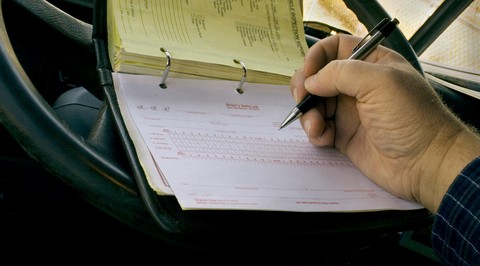
- What Safety Laws Apply to Trucks?
- Do Laws Regulate the Amount of Time a Trucker Spends on the Road?
- Does the Federal Government Regulate the Weight and Size of Trucks?
- How Are the Limitations on a Driver’s Hours of Service Enforced?
- Is There a Link Between Truck Driver Pay and Safety?
- What is a Commercial Driver’s License?
- What are Some Common Causes of Truck Accidents?
- Truck Insurance
- Settlement and Trial of Truck Accident Cases
How Are the Limitations on a Driver’s Hours of Service Enforced?
In 2003, the Federal Motor Carrier Safety Administration (FMCSA) revised the federal laws governing the hours of service (HOS) that a truck driver may operate his commercial vehicle. Those rules, which had not previously been substantially, modified since 1939 place specific restrictions on the maximum hours that a driver is allowed to operate his vehicle.
According to the FMCSA the new rule will save up to 75 lives and prevent as many as 1,326 fatigue-related crashes annually. The FMCSA reports that there were an estimated 4,902 truck related fatalities in traffic crashes in the year 2002.
Although the implementation of these rules in theory will save lives, how will they be enforced to actually save lives? Since the very first HOS regulations in 1939, drivers of commercial motor vehicles have been required to maintain a driver’s log book.
The accepted form of the driver’s log book requires entries for the following information:
* Month, day, and year
* Odometer reading at beginning of trip
* Total number of miles driven for logged date
* Vehicle class
* Total hours of time for off duty, sleeper berth, driving, and on duty time
* tire pressure
* Driver’s signature
Since each state requires that drivers stop at weigh stations to make sure that the vehicle is compliant with gross weight laws, the driver’s log book is usually checked during those weigh station stops. Also, Department of Transportation officers and state and local police officers may make routine and random stops of commercial vehicles to check the driver’s log book.
Experienced truck drivers know how to manipulate and/or change log book entries to appear legal. For instance, at the beginning of the trip a truck driver may accurately fill out information about his mileage and hours in a particular state.
When he enters a state far away from the state in which his trip originated, he can remove the original log book entry and make a new entry to change the mileage between cities. (Log book pages are in a 3 ring binder) Since most enforcement officers do not know the correct mileage between a given city in a state far away, they may not catch the inaccuracy which would allow the driver to subvert the HOS rules.
Some states now allow drivers to pay for and carry a “free pass”. This program, which is not implemented in all states, utilizes weighing scales which are placed under the cement on the interstate which allows a truck to be weighed while it is moving. The truck has a transmitter in it to transmit company information to the weigh station without the need to stop. Although this greatly decreases a driver’s down time at weigh stations, it also decreases the available opportunity to check the driver’s log book.





